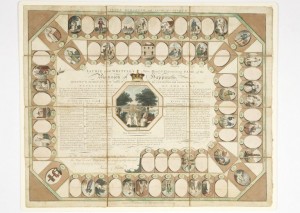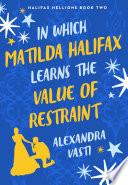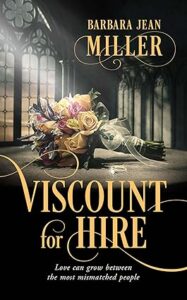Occasionally, I get on a bent of reading material other than Reg Rom. Shocking, I know. Lately, in my quest to deepen my characters and write better comedy, it has been to duck dive in to modern philosophy and psychology on happiness.
In combination with this, I have been revisiting some of my old favorite philosophers who, writing in the early 20th century, seem to pinpoint many of the same truths that positive psychologists and research scientists are proclaiming to be new developments in the human search for the happiness solution.
In fact, Bertrand Russell pointed out references to happiness and unhappiness existed at least as far back as Ecclesiastes.
Which naturally caused me to wonder what the consensus on happiness and its pursuit was in Regency England.
The first board game ever printed in the USA was called the Mansion of Happiness (1843). It originally was developed and printed by George Fox in England circa 1800. “The publishers dedicated this game to the then Duchess of York, and the Mansion of Happiness itself is a representation of Oatlands Park, the residence of the Duke of York. The game is very strict compared to other moral games of the same period. The crimes are serious–theft, lying, drunkenness, cheating–and the punishments include prison sentences, whipping, the stocks and ducking: ‘Whoever gets into a Passion must be taken to the Water, have a ducking to cool him and pay a fine of one'” (http://collections.vam.ac.uk/item/O26295/laurie-and-whittles-new-moral-board-game-r-h-laurie/)
The game consisted of 67 squares illustrated with hand-coloured engraving on linen, and was generally a moral monopoly or game of Life (rules available at the link above). No doubt a game of the aristocracy and tonnish circles, it gave young gamers the opportunity to play at morals and immorality of the day rather than passively listening to these sermonized.
Happiness in Regency England was very much the domain of religion, but it also had a peculiarly modern bent (that would, many argue, be stripped away by the stringent Victorians) ala the pursuit of pleasure, fame, and wealth. Love, too, had been undergoing a significant romantic turn which made marriages more about individual happiness than inheritance and wealth security. Likewise, unhappiness and boredom had become affected postures and tragic romantic archetypes (Byron and the stuff of the gothics).
So happiness and unhappiness was on the Regency population’s mind perhaps in ways that differed from the past…thanks to technology, invention, an industrializing economy and changes in gender roles.
Wealth, or the abundance of, for example was clearly understood and articulated as most distinctly not the key to happiness:
“(The Guide to Domestic Happiness, 1804).
Just as modern non-fiction will warn of the hedonic treadmill and the dangers of keeping up with the Joneses, Regency writers wanted to clearly warn audiences about the importance of avoiding sins of gluttony, vanity, envy and greed. Although the Regency tomes were less trenched in the language of depression, anxiety, brain chemistry, and information overload they were still very much aware of issues like materialism, sensory pleasures, and the culpability of thought to manipulate our sense of well being (Elements of Modern Materialism: Inculcating the Idea of a Future …, Volume 1, Charles Knowlton).
I am always struck at how much we know and how little we learn from era to era. It seems that even as modern life was becoming, we were already aware of the pitfalls.
Understanding this also adds new depth to Austen and how morality was not only important to her characters because of social pressures but also because they very much believed it determined their future happiness. That Elizabeth Bennet should refuse Mr. Collins on the pretense of their match being an unhappy one suggests a character that was willing to forgo those social pressures for her more modern beliefs in romance. In many ways, the title suggests that our H/h are in fact suffering from deadly sin that, without growth and redemption, would no doubt destroy their future happiness.











